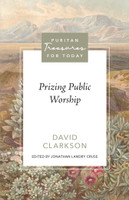
EBOOK Prizing Public Worship (Clarkson) - Puritan Treasures for Today
- Affordable shipping (free $100+)
- 100,000+ customers served
- "Wonderful books, great prices, awesome customer service." – Ivan, IL
Description
Public worship has fallen on hard times. In our individualized age, there is little we value doing communally, especially when there is an alternative that can be tailor-fit for our personal wants and preferences. Thankfully, David Clarkson helps us understand the superior privilege of public worship and the responsibilities believers have as they engage in it. He compellingly argues that the glory of God demands the corporate worship of His people. Moreover, public worship is not simply something we should do; it is something we should love. Read this book and learn to prize the ordinary means of grace as God's precious gifts to His people.
Contents
Preface
Part 1: The Primacy of Public Worship
1. God Loves the Gates of Zion
2. Why God Prefers Public Worship to Private
3. Why We May Not Love Corporate Worship
4. Reproving Two Errors
5. Spiritual Helps to Prioritizing Public Worship
Part 2: Profiting from Public Worship
Chapter 6: Practices to Inhabit
Chapter 7: Pitfalls to Avoid
Part 3: Hearing the Word
Chapter 8: Hearing and Hearing Well
Chapter 9: Impediments for Not Hearing Well
Chapter 10: Directions for Hearing Well
Endorsement
"Clarkson's message is one we desperately need to hear today. What is the priority: public or private worship; congregational or individual devotions; or, to bring the discussion up-to-date, physical presence with the church or live stream at home? With Puritan thoroughness and an eye to the pratical, he provides a clarifying and convincing case for the supremacy of the church gathered publicly under the means of grace as administered by the ordained ministry."
— Terry L. Johnson, senior minister, Independent Presbyterian Church, Savannah, Georgia
About the Author
David Clarkson (1622-1686) ministered in London until he and other Puritans were removed during the Great Ejection of 1662. He later became copastor with John Owen of an Independent congregation. The Works of David Clarkson are published by Banner of Truth.
Edited by Jonathan Landry Cruse





